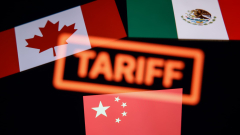Canadian, Mexican and Chinese flags.
Nurphoto | Nurphoto | Getty Images
U.S. President Donald Trump on Saturday imposed long-threatened tariffs on imports from Canada, Mexico and China — and it didn’t take long for the countries to respond.
Trump signed an order slapping 25% tariffs on goods from Mexico and Canada, and a 10% duty on Chinese imports, due to start on Tuesday. Energy resources from Canada face a lower, 10% tariff to “minimize any disruptive effects we might have on gasoline and home heating oil prices,” according to a senior administration official.
In the executive order, Trump said that if the countries — the U.S.’s three-largest trading partners — retaliate, it could be met with an “increase or expand in scope” of the duties already imposed.
In a post on X, Trump said the duties had been imposed “because of the major threat of illegal aliens and deadly drugs killing our Citizens, including fentanyl.”
The U.S. does about $1.6 trillion in business each year with Canada, Mexico and China. The tariffs are expected to be used as both bargaining chips and methods to effect foreign policy changes — specifically regarding immigration and drug trade issues — by the Trump administration.
Reaction from one of the three countries was swift and decisive, while the others appeared to take more of a wait-and-see approach to Trump’s tariffs. The European Union is also watching how the newly imposed tariffs will play out, after Trump recently took aim at the EU for what he claims is an unequal trade relationship. Here is a look at their responses.
Canada
Canadian Prime Minister Justin Trudeau slapped retaliatory tariffs of 25% against $155 billion of U.S. goods soon after the Trump tariffs were announced.
Canada’s Prime Minister Justin Trudeau speaks, flanked by (from L) Minister of Public Safety David McGuinty, Minister of Foreign Affairs Melanie Joly and Minister of Finance and Intergovernmental Affairs Dominic LeBlanc, during a news conference Feb. 1, 2025.
Dave Chan | Afp | Getty Images
He said duties on $30 billion worth of U.S. goods will be imposed on Tuesday, with tariffs on a further $125 billion worth of products are due to be introduced in 21 days, “to allow Canadian companies and supply chains to seek to find alternatives.”
“Like the American tariffs, our response will also be far-reaching and include everyday items such as American beer, wine and bourbon, fruits and fruit juices, including orange juice, along with vegetables, perfume, clothing and shoes,” Trudeau said in a press conference on Saturday evening. “It’ll include major consumer products like household appliances, furniture and sports equipment, and materials like lumber and plastics, along with much, much more.”
Addressing American citizens directly, Trudeau added: “This is a choice that, yes, will harm Canadians, but beyond that, it will have real consequences for you, the American people.”
Retaliatory tariffs are expected to further exacerbate price hikes in both the U.S. and elsewhere. The price of everything from cars and electronics to toys and food is expected to be impacted.
Trudeau added that “it doesn’t have to be this way.”
“Yes, we’ve had our differences in the past, but we’ve always found a way to get past them. As I’ve said before, if President Trump wants to usher in a new golden age for the United States, the better path is to partner with Canada, not to punish us,” he said.
Meanwhile, Ontario said it will pull all American alcohol products from its government-run liquor shelves beginning Tuesday in response to the tariffs. Outlets of the Liquor Control Board of Ontario will also take U.S. products out of its catalog so other retailers can’t order or restock those items, according to a Sunday statement by Premier Doug Ford.
Mexico
Mexico also vowed retaliation following the news, although did not reveal specifics.
President Claudia Sheinbaum slammed Trump’s tariffs and said she had instructed the secretary of the economy to “implement the Plan B we have been working on, which includes tariff and non-tariff measures in defense of Mexico’s interests.”
Mexico’s Pr




